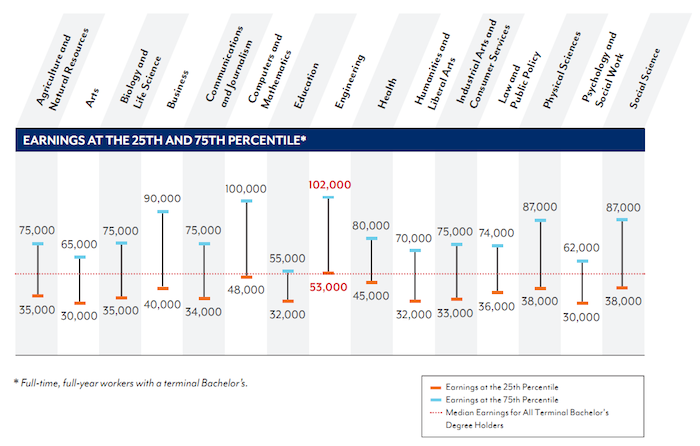Georgetown University Center on Education and the Workforce has produced a new report looking at the value of different college degrees in the USA. I have seen a great increase in discussions of the “bubble” in education. Those articles often say a college degree doesn’t assure the success it used to. The data I review seems to show extremely large benefits for those with a college degree (higher salaries but, much more importantly, in my opinion, they also have much lower unemployment rates).
Those benefits are greatest for several majors including science, math and engineering. The problem I see is not so much that significant benefits are lacking for college degrees but the huge increases in costs of getting a degree are so large that for some majors the cost is just so large that even with the benefits it is arguable whether it is worth the cost (while a few decades ago the benefits were universal and so large the economic benefit was not debatable).
The authors of the report found that all undergraduate majors are worthwhile, even taking into account the cost of college and lost earnings. However, the lifetime advantage ranges from $1,090,000 for Engineering majors to $241,000 for Education majors. As I have written frequently on the Curious Cat Science and Engineering blog, engineering degrees are very financially rewarding.
The top 10 majors with the highest median earnings for new graduates are:
- Petroleum Engineer ($120,000)
- Pharmacy/pharmaceutical Sciences and Administration ($105,000)
- Mathematics and Computer Sciences ($98,000)
- Aerospace Engineering ($87,000)
- Chemical Engineering ($86,000)
- Electrical Engineering ($85,000)
- Naval Architecture and Marine Engineering ($82,000)
- Mechanical Engineering, Metallurgical Engineering and Mining and Mineral Engineering (each with median earnings of $80,000)
Related: 10 Jobs That Provide a Great Return on Investment – Mathematicians Top List of Best Occupations – New Graduates Should Live Frugally
Even with the extremely high current unemployment rate, some fields have virtually no unemployment: geological and geophysical engineering; military technologies; pharmacology, and school student counseling. Engineering overall has very low unemployment rates (under 4% today, I believe). While majors with the highest unemployment rates are in the fields of: Social Psychology (16%); Nuclear Engineering (11%) [a high rate, but it is also wise to remember the total number of these is a very small portion of engineers overall]; and Educational Administration and Supervision (11%).
Nuclear engineering is a gamble now I think (potentially highly rewarding, but I would gamble on it myself). If 10 years from now countries have decided nuclear is safe enough it may well pay extremely well as countries look to avoid more negative impacts from climate change. The current lowered number of graduates is similar to what happened to petroleum engineering). People often forget oil prices crashed, and exploration crashed, and demand for petroleum engineers crashed, and salaries decreased, and students didn’t choose that major. Then when exploration boomed there was also very few available engineers and over a decade later the supply of petroleum engineers is still not meeting demand – thus the continued very high salaries.
Graduate degrees were also found to provide economic benefits. The highest increases in earnings are in the areas related to healthcare and biology: Health and Medical Preparatory Programs (190%); Miscellaneous Social Sciences (134%); and Zoology (123%). Meanwhile, the majors in which students have shown the lowest earnings boost from advanced degrees are: Atmospheric Sciences and Meteorology (1%); Studio Arts (3%); and Petroleum Engineering (7%). Biology and Life Science majors, make $35,000 more at the median with a graduate degree. Engineers with a bachelors degree have a median salary of $75,000 and with a graduate degree have a median salary of $99,000.
My guess is that the small benefit of petroleum engineering graduate is due to the extremely high wages for those with any degree. There was a paucity of graduates that left the market willing to pay even for bachelors degrees. And it is hard to make up for the lost of very high wages while studying for the graduate degree. I expect wages to decline a bit going forward for bachelor degrees which then may well make the graduate degrees pay off in the future at a better (though still somewhat lower rate).
The analyses contained in this report are based on newly released data from the 2009 American Community
Survey (ACS) by the USA census bureau.
Comments
6 Comments so far

[…] that only have bachelors degrees. Also see a detailed post from the Curious Cat Economics blog looking at the value of college degrees based on the Georgetown […]
[…] As I mentioned in a previous post, I believe the most important factor for a career is finding something you love to do, but within those possibilities it is nice to know the payoff of different college degrees. […]
So if the costs of college for them are just as high as those in the top tenth percentile it is reasonable to expect they may take longer to pay it back or fail to do so.
I believe this is more a thought experiment than something to definitively measure…
But the design of STEM education could be greatly improved to avoiding turning off many people who would enjoy the education and a career if the education process were better…
The top 15 bachelor degrees by mid-career salary were all from engineering, math or science…
[…] As I have said before the reason to chose a career is because that is the work you love, but in choosing between several possible careers it may be sensible to consider the likely economic results. And in choosing how much to spend on your education considering your future earnings is wise. […]